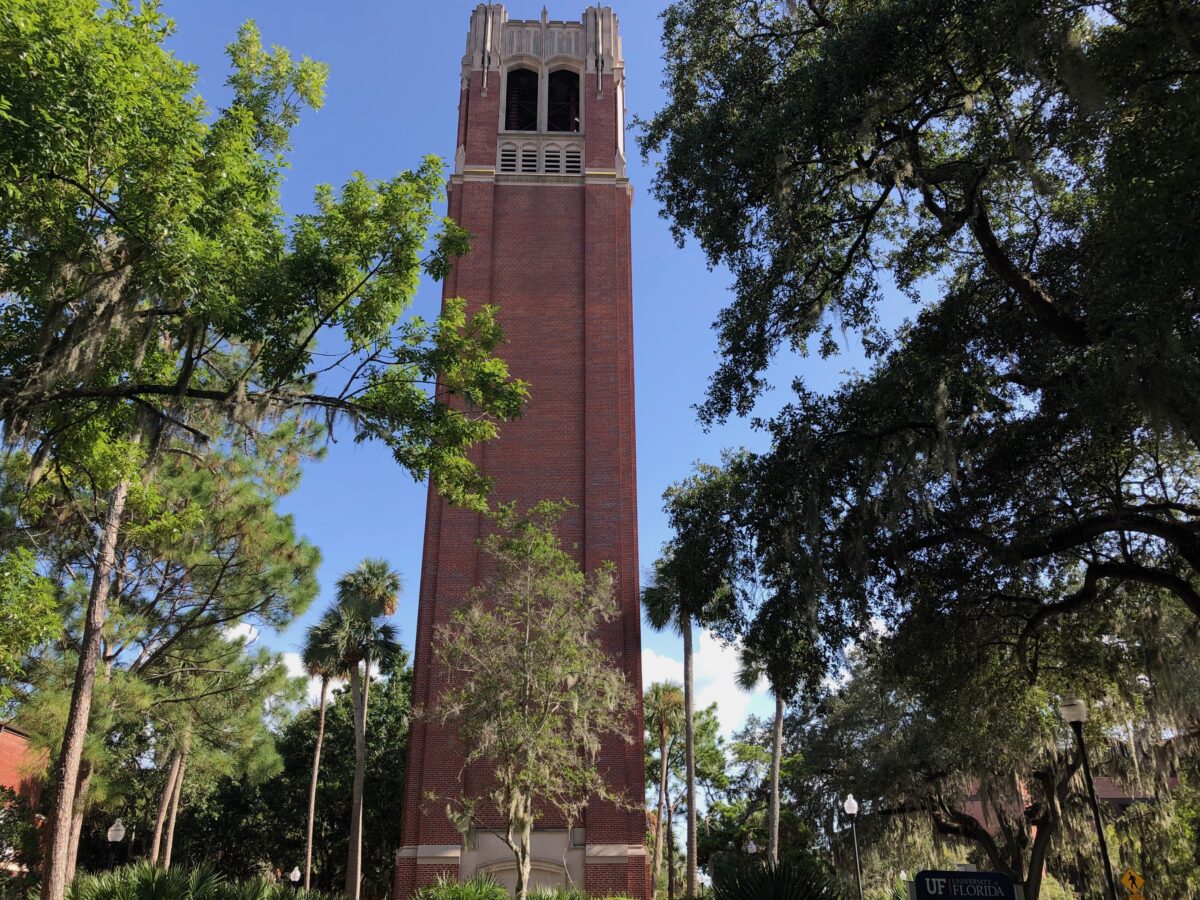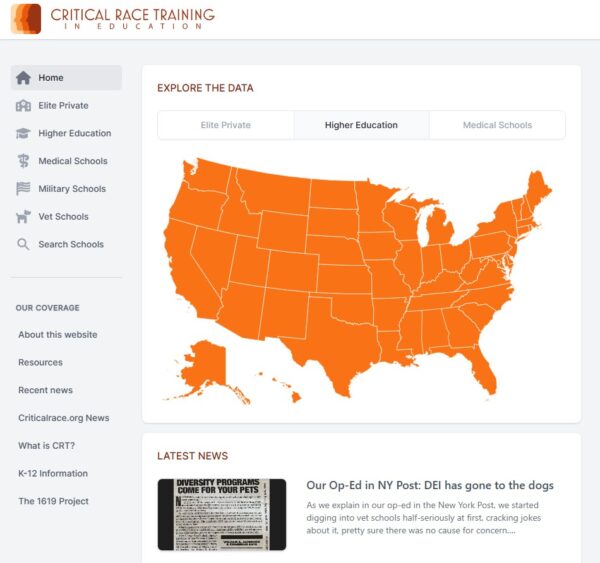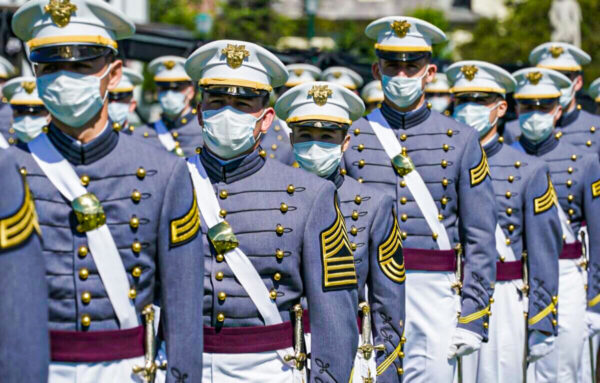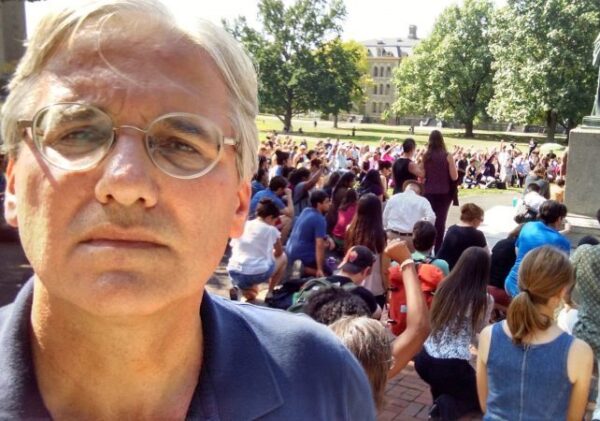


A website developed by a Cornell University law professor to track critical race theory (CRT) in America’s colleges and universities is expanding to expose CRT’s presence in the curriculum at elite K-12 and medical schools.
Criticalrace.org is a website created by Cornell Professor William Jacobson, featuring a state-by-state compilation of America’s educational institutions and a report on which ones promote critical race theory (CRT) in their curriculum.
The website features an interactive map of the United States. Clicking on a state reveals detailed information on what Jacobson’s research has uncovered there.
“California,” for example, “has adopted many aspects of CRT at all levels of education.”
“Florida,” on the other hand, “is a study in contrasts,” according to the website.
“On the one hand, Governor Ron DeSantis worked with the Florida Board of Education” and banned CRT from K-12 education in the state.
“On the other hand, the State University System (SUS) called for an expansion of social justice and expressed a desire to battle systemic inequities.”
Instead, DeSantis signed a new law on May 15 defunding diversity equity and inclusion initiatives at Florida’s universities and colleges.
The higher education database reveals that California, with a population of around 38,916,000, has 38 institutions where CRT is part of the curriculum. Florida, with a population of around 22,662,000, has 10.
A new database for medical schools reveals Texas, with a population of over 30,500,000, has six institutions that interject CRT into its curriculum. New York, with a population of less than 19,500,000, has 11.
Jonathan Butcher, Senior Research Fellow in Education Policy at The Heritage Foundation says he’s been on Jacobson’s website often.
“It’s good that it’s so narrowly focused on one area of the woke landscape,” Butcher told The Epoch Times. “I really think he’s put together a great tool.”
Regarding Jacobson’s revelation that CRT is now even part of the curriculum at veterinarian schools, Butcher recalled a piece he wrote on Sept. 29, 2021, about a newly hired music teacher at Arizona State University, brought on board to train K-12 music teachers “from a critical race theory perspective.”
“What they are trying to do is to teach whatever subject it might be as part of another struggle for power, between a marginalized class and an oppressive class,” Butcher said, noting that CRT is embedded deeply into the higher education culture, particularly in law school as it’s rooted in critical legal theory.
“This is what makes Jacobson’s resource so valuable,” Butcher said, suggesting it “serves as a call to action” by demonstrating how ubiquitous the ideology is.
“This gives you a measure of the amount of unrest and disruption that colleges are teaching students to be a part of,” Butcher said.
Jacobson’s first project, Legal Insurrection (LI), first went live on Oct. 12, 2008. In 2019, legalinsurrection.com officially became a platform for the Legal Insurrection Foundation, a 501(c)(3) tax-exempt organization.
Criticalrace.org was the first major project born of the LI Foundation.
“We thought it would be a nice little website that might not get much attention, but we thought it was important to have a database of where CRT was being taught,” Jacobson told The Epoch Times. “It has gotten an enormous amount of attention. Today we have over 500 higher-ed schools, colleges, and universities.”
The database has now expanded to include CRT reports on the top 100 medical schools ranked by U.S. News and World Report.
“The goal this year is to cover the schools we haven’t covered yet,” Jacobson explained. “We have also covered the top 50 elite K-12 private schools, the fancy boarding and day schools. We’re hoping to expand that to the top 100 this year. We’ve also covered U.S. military academies and within the last month we started covering veterinarian schools.”
Jacobson noted that it wasn’t until recently that he realized CRT was even invading veterinarian schools.
“A lot of this starts with a tip,” Jacobson explained, adding that the vet school database “started when a vet student contacted us and said, ‘You’re not going to believe what’s going on in veterinarian school.'”
The revelation came as such a surprise that Jacobson was compelled to share his thoughts on the unexpected phenomenon.
“Nothing is safe from diversity, equity and inclusion ideology—not even your dog,” Jacobson wrote in an April 19 op-ed for the New York Post, adding that diversity, equity and inclusion “is one of the ways critical race theory is put into action.”
“Critical race theory is something I have been familiar with for a very long time, ” Jacobson said, recalling how CRT came to Harvard Law School in the early 1980’s when he was a student there. “They called it ‘Critical Legal Theory’ at that time,” Jacobson reflected. “But it very much had a racial overtone. The things we now call Critical Race Theory were definitely discussed.”
Cornell’s website defines critical legal studies (CLS) as “a theory which states that the law is necessarily intertwined with social issues, particularly stating that the law has inherent social biases (pdf). Proponents of CLS believe that the law supports the interests of those who create the law.”
Cornell further explained that CLS was officially started in 1977 at a conference at the University of Wisconsin-Madison. Its founders “borrowed from non-legal fields such as social theory, political philosophy, economics, and literary theory.”
Jacobson points to Kimberlé Williams Crenshaw as “the person most prominent in promoting CRT.” Crenshaw, a law professor at UCLA School of Law and Columbia Law School, first coined the term “intersectionality” more than three decades ago.
Crenshaw was a classmate of Jacobson’s at Harvard, where he saw CRT evolve from its early stages.
“I didn’t really pay attention to it because I went into private practice,” Jacobson said, explaining that he didn’t focus on it again until he arrived at Cornell Law School at the end of 2007 and found himself “more exposed to what was going on in academia.”
That was when Jacobson was inspired to launch Legal Insurrection.
The inspiration for Criticalrace.org came from what Jacobson describes as “the explosion of mandatory programs called ‘anti-racism training’ and ‘anti-racism education’ at colleges and universities” in the wake of the death of George Floyd in May of 2020.
In the aftermath of Floyd’s death, Cornell President Martha E. Pollack posted a message to her fellow “Cornellians” on June 3, 2020, saying, “As a campus community, we have a collective responsibility to engage in difficult but critical conversations—to listen genuinely to, and learn from, one another.”
“To help bring focus to these conversations,” Pollack urged her colleagues “to participate in a Community Book Read of ‘How to Be an Antiracist’ by National Book Award winner Ibram X. Kendi.”
Kendi is a racial activist who promotes the idea that racist policies and ideas are deeply ingrained in American society.
“I hope you will choose to read the book and to join in the conversation,” Pollack said.
“That was the first time I actually read his book, and it was pretty shocking,” Jacobson said. “It advocated the use of discrimination to cure past discrimination.”
Jacobson then cited Kendi’s “most famous quote:”
“The only remedy to racist discrimination is anti-racist discrimination. The only remedy to past discrimination is present discrimination. The only remedy to present discrimination is future discrimination.”
“That’s a pretty strange thing for a university to be promoting,” Jacobson said, adding that “they didn’t just have his book as our designated summer reading, but it was also going to be promoted in student group meetings when students returned to campus and as the basis for informal, non-credit seminars.”
That was when Jacobson began to explore the tenants of CRT and discovered how widespread Kendi’s “anti-racism” philosophy had become, particularly in academia.
Angered by Jacobson’s outspoken stance on CRT, 21 of his Cornell colleagues signed a June 9, letter denouncing unnamed “commentators … attached to Ivy League Institutions,” who were critical of Black Lives Matter and demanding “accountability.” In response, prominent liberal George Washington University law professor Jonathan Turley defended Jacobson, saying the letter was “the antipathy of the intellectual foundations for higher education. Rather than address the merits of arguments, you attack those with opposing views personally and viciously.”
Jacobson described the “awkward relationship” that developed between himself and his colleagues at Cornell, “given the overwhelmingly liberal faculty and atmosphere.”
“Living as a conservative on a liberal campus is like being the mouse waiting for the cat to pounce,” he wrote on June 11, 2020.
On July 16, 2020, Pollack issued another message to her colleagues, announcing that more needed to be done to “create a more just and equitable Cornell.”
“It is clear that we must think and act holistically to change structures and systems that inherently privilege some more than others,” Pollack wrote.
In a Sept. 8, 2020, open letter to Pollack and other university officials, several hundred Cornell faculty and students outlined “Immediate” and “Longer-Term Demands” for what her anti-racism initiative should look like in all departments and curricula from undergraduate to postdoc.
“It was a document that called for outright discrimination and racial preferences in hiring or promotion, and it was signed by some prominent professors, including nine law professors,” Jacobson said, noting that “the philosophy in that letter is actually contrary to Cornell anti-discrimination policies and contrary to state and federal law.”
New York State Law declares that the failure to prevent discrimination “menaces the institutions and foundation of a free democratic state.” Federal Law “forbids discrimination in every aspect of employment.”
According to its website, “Cornell University prohibits its faculty, administrative and academic staff, postdocs, and undergraduate and graduate students from engaging in any form of prohibited discrimination.”
It was reading these”demands” that inspired Jacobson to research and document precisely where CRT was being promoted in America’s institutions of higher learning. Criticalrace.org was born.
“We launched on February 2, 2021, and announced the project on Tucker Carlson’s show,” Jacobson recalled, adding that he only had around 200 colleges and universities in the database at the time.
“I didn’t realize how big it would become,” he admitted. “But by midnight after being on Carlson’s program we had over 400,000 visits. At one point, we had over 70,000 people on our website. It’s a miracle it didn’t crash. By the next day, we had over a million visits. It was then we thought, ‘Yes, this could be an interesting website.'”






